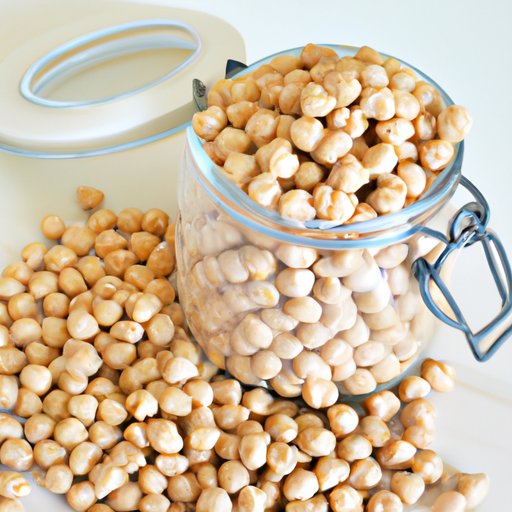
I. Introduction
Chickpeas, also known as garbanzo beans, have been a staple in Middle Eastern and Mediterranean cuisine for centuries, and they have recently gained popularity worldwide due to their versatility, taste and health benefits. These legumes are packed with protein, fiber, vitamins, and minerals, making them an excellent addition to any healthy diet. In this article, we will delve into the nutritional value and health benefits of chickpeas, explore their versatility in various meals and diets, and discuss their cultural significance. Our goal is to help readers discover the multiple ways they can incorporate chickpeas into their diets for optimal health and taste.
II. The Health Benefits of Chickpeas
Chickpeas are a complete source of plant-based protein, with one cup of cooked chickpeas supplying 15 grams of protein. They are also high in fiber, which is essential for digestive health. A cup of cooked chickpeas contains 11 grams of fiber, which is almost half of the daily recommended intake. Chickpeas are also rich in important vitamins and minerals such as iron, folate, phosphorus, and potassium.
Studies have shown chickpeas to have many health benefits, including reducing inflammation, lowering cholesterol levels, and improving blood sugar control. A 2014 study published in Nutrition Journal suggests that consuming chickpeas may lower overall cholesterol levels. Another study found that incorporating chickpeas into the diet may help in reducing the risk of developing type 2 diabetes.
The unique nutritional qualities of chickpeas are attributed to their high levels of resistant starch, a type of carbohydrate that is not fully digested in the small intestine and is fermented in the large intestine. This process promotes the growth of beneficial bacteria and reduces the risk of colon cancer.
III. The Versatile Chickpeas
Chickpeas are incredibly versatile and can be incorporated in many sorts of meals such as soups, salads, stews, hummus, or falafel. They also work well as a meat substitute in vegetarian and vegan recipes. Falafels, a popular middle-eastern dish, are made from ground chickpeas, often served in a pita bread with lettuce, tomatoes, and drizzled with tahini sauce. Other chickpea recipes include chickpea curry, chickpea burgers, and roasted chickpeas as a snack.
Chickpeas provide a nutrient-dense food source for vegetarian and vegan diets, as they supply both protein and fiber, which are important for building muscle and maintaining a healthy weight. Furthermore, chickpea-based meals are cost-efficient, making it a perfect option for people seeking healthy meals on a budget.
Here are some quick and easy chickpea recipes to try at home:
- Roasted chickpeas with spices
- Chickpea and sweet potato curry
- Quinoa and chickpea salad
- Chickpea and vegetable stir-fry
IV. Chickpeas for Diet and Weight Loss
Due to their high fiber content and a low glycemic index, chickpeas make a perfect option for people who want to manage their weight and improve their overall health. Fiber regulates digestion and promotes a feeling of fullness, which can prevent overeating. Also, chickpeas contain fewer calories than animal protein per serving while still providing a similar amount of protein. Additionally, protein from plant sources might be associated with a lower risk of developing cardiovascular disease.
Some simple chickpea meal plans to help with weight loss include:
- Chickpea and vegetable stir-fry with brown rice
- Chickpea salad with mixed greens and lemon-tahini dressing
- Chickpea and sweet potato curry with quinoa
V. Chickpeas for Heart Health and Disease Prevention
Chickpeas are known to have a positive impact on heart health, as they contain fiber, potassium, and folate, all of which are associated with cardiovascular health. A study published in the Journal of the American College of Nutrition found that eating chickpeas may help reduce the risk of high blood pressure, a significant contributor to heart disease. Moreover, a diet high in fiber and plant-based protein may reduce the risk of heart disease occurrence. Chickpeas consumption may result in lower bad cholesterol levels, higher good cholesterol levels, and lower blood pressure, reducing the risk of heart failure and having an overall positive effect on cardiac health.
VI. Exploring Chickpeas’ Cultural Significance
Chickpeas are essential to Middle Eastern cuisine and have been a staple in the region for thousands of years. Hummus, a dip made from mashed chickpeas, tahini, olive oil, and lemon juice, is a staple in many countries in the region. Falafels and shakshuka, a dish of poached eggs cooked in a tomato-and-chickpea stew, are also commonly enjoyed. In the Mediterranean, chickpeas are incorporated into stews, salads, and soups. In India, chole masala, a curry dish that uses chickpeas instead of meat, is a popular dish.
The rich cultural history of chickpeas indicates their significance amid diverse culinary cultures and their enduring popularity around the world.
VII. Chickpeas for Vegetarian Athletes
Vegetarian and vegan athletes can struggle to get enough protein in their diets, and chickpeas are a delicious, cost-effective solution. One cup of chickpeas provides 15 grams of protein, and they also contain iron, an essential mineral for energy production and endurance. Here are some high-protein chickpea meal ideas for athletes:
- Chickpea hummus with carrot or celery sticks
- Chickpea and vegetable stir-fry
- Chickpea and quinoa salad with edamame
- Chickpea falafel wrap
VIII. Conclusion
Chickpeas represent a food source rich in nutrients, vitamins, and minerals essential to a healthy diet, making them an excellent addition to anyone’s diet. Chickpeas deliver a wide range of health benefits, including weight management, chronic disease prevention, and support to digestive health. There are endless ways to use chickpeas in recipes, making them an ideal food for those on a budget, vegetarians, vegans, or anyone seeking to incorporate healthier eating habits.
The versatility, taste, and health benefits of chickpeas prove that they are worth exploring and incorporating in our diets. By being creative and bold in trying out new recipes, everyone can enjoy the many health benefits of this versatile legume while indulging in flavors from around the world.





